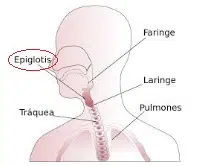The Greek word epiglōttís gave rise to the late Latin epiglottis , which came to Spanish as epiglottis . It is interesting to know that this Greek term is the result of the sum of two significant components of said language:
-The prefix “epi-”, which can be translated as “above”.
-The noun “glottís”, which means “back of the tongue”. That word, in turn, comes from “glotta”, which is synonymous with “tongue”.
This term is used in the field of anatomy to refer to the cartilaginous structure of mammalian animals that is attached to the posterior sector of the tongue and allows the glottis to be blocked at the time of swallowing.
 The glottis is the anterior cavity of the larynx , the organ that connects the pharynx with the trachea. When a person eats food and swallows it, the food that enters through the mouth must reach the stomach. What the epiglottis does is cover the glottis so that food does not enter the respiratory system and follows its normal course through the digestive system.
The glottis is the anterior cavity of the larynx , the organ that connects the pharynx with the trachea. When a person eats food and swallows it, the food that enters through the mouth must reach the stomach. What the epiglottis does is cover the glottis so that food does not enter the respiratory system and follows its normal course through the digestive system.
The epiglottis, therefore, moves according to the needs of the body . In its resting state, it remains upright so that air can pass to the larynx and lungs. During the swallowing process, however, the epiglottis folds and blocks the entrance to the larynx: this prevents food from entering the trachea and lungs. Once the subject has swallowed, the epiglottis recovers its original position.
There are various disorders that can affect the epiglottis. Epiglottitis is an inflammation of this structure that usually affects children under 7 years of age, although it can occur at any age. Epiglottitis can be caused by a bacterial infection or injury : when the epiglottis becomes inflamed, the individual feels pain in the throat area, experiences problems breathing and swallowing, and may have a fever.
Among the causes that can give rise to inflammation of the epiglottis, we also find the burn caused by ingesting very hot drinks.
Other symptoms that indicate that a child has epiglottitis are drooling, excessively restless behavior, difficulty swallowing normally, and even pain or a different sound made when inhaling. If it happens that an adult has this pathology, in addition to the symptoms mentioned above, they could have others such as notable difficulty breathing and a very hoarse voice.
It is considered that there are a series of factors that make one person more prone than another to suffer from epiglottitis. Specifically, among these factors are being a man, not having the corresponding vaccines and also having a weak immune system.
In addition to all the above, we cannot ignore that this pathology can present with some complications. Specifically, it is possible that the person who suffers from it has a spread of the infection and even suffers respiratory failure.
